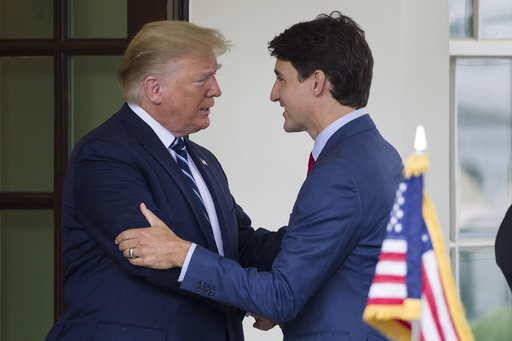
TORONTO — In light of potential tariffs threatened by President-elect Donald Trump, Canada is currently evaluating its options for retaliatory tariffs on specific goods imported from the United States. This information was disclosed by a senior official on Wednesday.
Trump has made it clear that he plans to impose tariffs on products from both Canada and Mexico if these nations do not address his concerns regarding the trafficking of drugs and migrants along their borders. He mentioned a proposed 25% tax on all products entering the United States from Canada and Mexico as part of his initial executive actions.
A Canadian government representative stated that the country is preparing for various scenarios and has begun identifying which items could be subjected to tariffs in retaliation if necessary. The official emphasized that no definitive course of action has been determined yet and chose to remain anonymous due to the sensitive nature of the discussions.
During Trump’s previous term, higher tariffs resulted in counter-actions from other countries. For example, Canada responded in 2018 by imposing several billion dollars in new tariffs against the U.S. as a reaction to the imposition of levies on Canadian steel and aluminum products.
In Canada’s previous retaliation, some products were selected based on their political relevance rather than purely economic factors. Notably, Canada imports around $3 million worth of yogurt annually from the U.S., largely sourced from a plant in Wisconsin, which is the home state of former House Speaker Paul Ryan, leading to a 10% duty on that product. Whiskey, predominantly produced in Tennessee and Kentucky, also featured on the list, with McConnell’s home state being Kentucky.
This latest threat by Trump comes amid discussions about illegal migration, despite the significantly lower figures at the Canadian border compared to those at the southern border. In October alone, the U.S. Border Patrol recorded 56,530 arrests at the Mexican border, whereas between October 2023 and September 2024, there were only 23,721 arrests at the Canadian section.
Canadian officials contest the inclusion of Canada in the same category as Mexico, arguing that they are prepared to collaborate with the Trump administration to address the numbers coming from Canada. They also express concerns over potential refugee flows northward should Trump undertake mass deportations.
In his comments, Trump raised concerns over fentanyl trafficking from both borders; however, the volume of fentanyl seized at the Canadian border remains minimal compared to seizures at the Mexican border, which stood at 21,100 pounds, in sharp contrast to 43 pounds seized from Canada last fiscal year.
Canadian representatives maintain that their country is not to blame and caution that any tariffs could have serious repercussions for both nations. Canada plays a pivotal role as the top export destination for 36 U.S. states, with nearly $3.6 billion Canadian (approximately US$2.7 billion) worth of goods and services crossing the border daily. Furthermore, Canada accounts for about 60% of U.S. crude oil imports and 85% of U.S. electricity imports, positioning it as a key source for essential materials like steel, aluminum, and uranium, all of which are critical for U.S. national security.
“Canada is vital to the energy supply of the United States,” stated Deputy Prime Minister Chrystia Freeland. If tariffs of 25% were to be applied to Canadian oil imports, it would likely complicate Trump’s pledge to cut U.S. energy costs by half within 18 months. In 2023, Canadian oil contributed significantly, making up nearly two-thirds of total U.S. oil imports and about one-fifth of the overall U.S. oil supply.
In response to the situation, Prime Minister Justin Trudeau is scheduled to hold an emergency virtual meeting with provincial leaders who are advocating for negotiations with the United States to establish a bilateral trade agreement that excludes Mexico.
In a parallel development, Mexican President Claudia Sheinbaum indicated that Mexico might retaliate with its own tariffs against the U.S. as the situation evolves.
